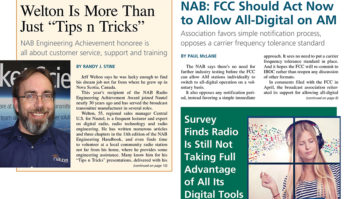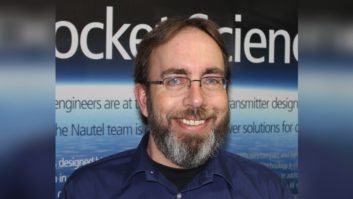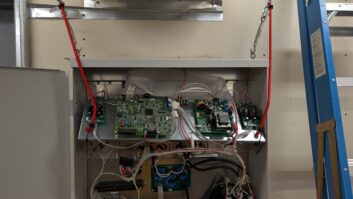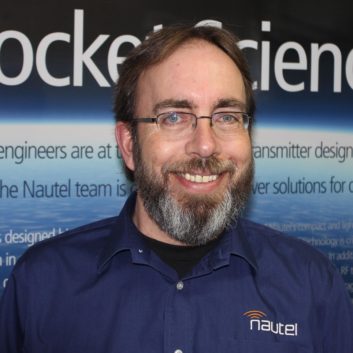 Jeff Welton says he was lucky enough to find his dream job not far from where he grew up in Nova Scotia, Canada.
Jeff Welton says he was lucky enough to find his dream job not far from where he grew up in Nova Scotia, Canada.
This year’s recipient of the NAB Radio Engineering Achievement Award joined Nautel nearly 30 years ago and has served the broadcast transmitter manufacturer in several roles.
Welton, 55, regional sales manager Central U.S. for Nautel, is a frequent lecturer and expert on digital radio, radio technology and radio engineering. He has written numerous articles and three chapters in the 11th edition of the NAB Engineering Handbook, and even finds time to volunteer at a local community radio station not far from his home, where he provides some engineering assistance. Many know him for his “Tips n Tricks” presentations, delivered with his warm sense of humor — as captured in the title of one called “How Not to Blow Stuff Up.”
The Canadian has been on a bit of a win streak. In 2018, the Society of Broadcast Engineers named Welton the James C. Wulliman Educator of the Year. In 2019 the Association of Public Radio Engineers handed him the APRE Engineering Achievement Award.
Radio World asked Welton his thoughts on trends in RF manufacturing and where digital radio is headed in the United States.
Radio World: You spent your first 17 years at Nautel in field service and technical support positions. What is the most important current trend radio broadcasters need to know about?
Jeff Welton: The biggest trend in transmitter manufacturing is IP connectivity. But most importantly for broadcast is the attendant need for IT security, which people are beginning to be made aware of; but it has been a very slow process.
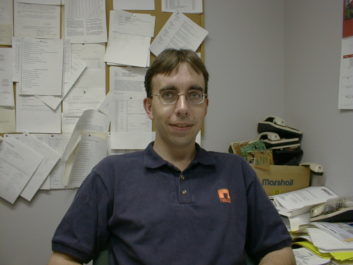
RW: How big of an issue is the security?
Welton: You have seen all of the news of IT ransomware attacks. There are many more hacks and viruses that happen every day that no one ever hears about. Occasionally I will do an Internet of Things search looking for unprotected devices, and if I search audio codes and search a few of the bigger names in codecs, I will find thousands of units online, and half will be using default user names and passwords. That’s the biggest thing right now for broadcasters to be aware of.
RW: You’re no longer on the design side of the transmitter business, but where does Nautel see RF design going next?
Welton: You certainly see the trend toward smaller footprints. More power density, more watts per cubic inch, so to speak. That trend will continue, but eventually the laws of physics dictate we just can’t get any smaller. Having said that, the laws of physics can always be challenged, and we will going forward.
RW: Any move by Nautel toward a liquid-cooled design for FM/HD transmitter? Some of your competition, like GatesAir and R&S, have been active in that segment.
Welton: I really can’t answer that question. No comment. That said, we have looked at liquid-cooling repeatedly over the years, going back as far as at least 15 years ago, if not further. We did a 20 kW design in the late ’90s/early 2000s that was liquid-cooled in the initial prototype.
Ultimately, at that time, we did decide to abandon it for several reasons. Even today, with the advances in the technology, it’s hard to justify the additional cost of liquid cooling in all but the highest power levels, and even then only in specific circumstances. Definitely there are advantages, but the flexibility and lower cost of an air-cooled system typically outweighs those advantages in most cases.
However, it certainly is situational. What may be the best cost benefit for a 30 kW station in one market may not apply equally to a similar station in a different market, climate or site situation.
My recommendation to radio broadcasters is to always get a couple of opinions, then try to sort out what provides the best long-term benefits for your station.
RW: How about all-digital for the AM band. Does Nautel see promise in that market?
Welton: Definitely, we are behind it and support it as a manufacturer. I think it will be good for the broadcast industry, but I’ll qualify that with one thing. It really all comes down to the content, honestly. I think the technology is great and it has promise, but without the worthwhile content and good programming, it is not going to solve any problems for AM broadcasters in the United States.
RW: You’re known as the “go to” tech support guy at Nautel, yet your official title is regional sales manager. Tell us more about what you do and how much travel is involved.
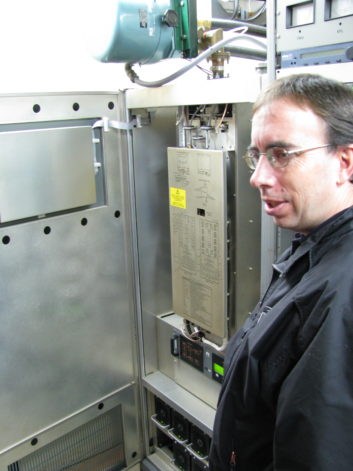
Welton: I travel anywhere from 100 to 200 days a year. It can vary quite a bit. I have the formal title of regional sales manager, but I pretty much focus on, as they say, “other duties as assigned.” I do seven to 10 state association shows a year. I do NAB of course. I do a half-dozen SBE presentations and some Nautel-sponsored webinars. I even stop in on sight occasionally to help with HD system installs. So I do get to do some hands-on work still.
RW: So you are out visiting facilities and meeting a lot of radio broadcast engineers. What is the most impressive thing you find about that group?
Welton: I think more than anything you find people who willing to be helpful to others, even their competition. You can find people who are competitors but then willing to help others in an emergency and work together. I’ve found that to be the case even during my tech support days.
RW: How do you think radio can navigate the problem of losing veteran engineers who have a deep knowledge of RF systems? Obviously this affects broadcasters and how they maintain their RF facilities.
Welton: Well, there is a solution, and it’s hard. We need to get young people bit by the bug. Once you get in this industry it really does get into your blood. You don’t see many people leave the industry once they are in it. Where else can you have so much fun and make a living at it? [chuckles]
I think the pay scale is coming up a bit, but the big thing is tweaking the interest of young folks. That might be hosting an engineering table at a state show career fair. You have to get the exposure to draw interest. There are lots of opportunities for people to be mentored and work part time while being in school still. That’s a great way into the profession
RW: You perform presentations every year on topics like lightning protection, grounding, transmitter site safety and various other subjects. Is there a topic out there you want to teach?
Welton: One of the big ones for me is HD Radio, AM and FM, and the implementation. The technology has developed so that I would like to put together a booklet and really dig in how to install and what to look for rather than the theory of the operation of the technology. Really it would be a practical application of HD Radio. So now that it is out there, I’d better get to work on it.
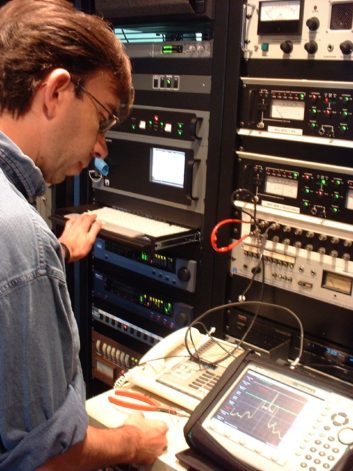
RW: Nautel has for some time thought about equipment beyond transmitters as a way to grow the business. Any new broadcast equipment coming down the pipe?
Welton: Not much I can say on the broadcast side. Much of the work we do outside of broadcast is non-disclosure since we are dealing with the military. We find lots of ways to keep busy and we do a lot of things in RF above and beyond radio, which is cool.
RW: Tell us something about yourself that surprises people when they learn it.
Welton: That I have a fully functioning wood working shop at my home right outside my office. I haven’t been able to work out in it much since I’ve been so busy with work. The last thing I built was a vanity for a bathroom remodel. I did all the cabinetry and built all of the drawers into it. That was cool. It’s a far departure from electronics
RW: Anything else keep you busy at home?
Welton: I love to cook. I spend a lot of time in the kitchen. I got a pressure cooker last year, and loved it so much I augmented that with a second one about a week later.
RW: How did you get your start at Nautel?
Welton: We had a speaker at my high school one day for career day talking about electronics school in Toronto. I grew up on a farm in Nova Scotia, so as soon as I heard the word “Toronto” I was hooked. He could have been talking about cosmetology school and I would have ended up being a hairdresser. So I went to Radio College of Canada (RCC) for electronics engineering.
Then I had a few jobs after that, including doing bench repair at Radio Shack. Then in 1990 Kevin Rodgers (now president and CEO of Nautel) was put in charge of building a customer service department for Nautel. By the luck of the draw I ended up there and have been ever since.
RW: What were your first thoughts upon learning of the NAB engineering award?
Welton: Really of all the people I need to thank for being where I am today. There have been so many people I’ve learned from. Jack Sellmeyer and Tom King come to mind if you are talking directional AM antennas. Gary Cavell has always been willing to answer my sometimes dumb questions. Mark Persons is always willing to share knowledge.
The one thing I always try to convey to people is that everybody everywhere knows something that somebody else doesn’t. I’ve just been very fortunate to find a bunch of people willing to share the things they know that I don’t. And there is a long list of things. The more I know the more I realize I don’t know it all. Not even close.

